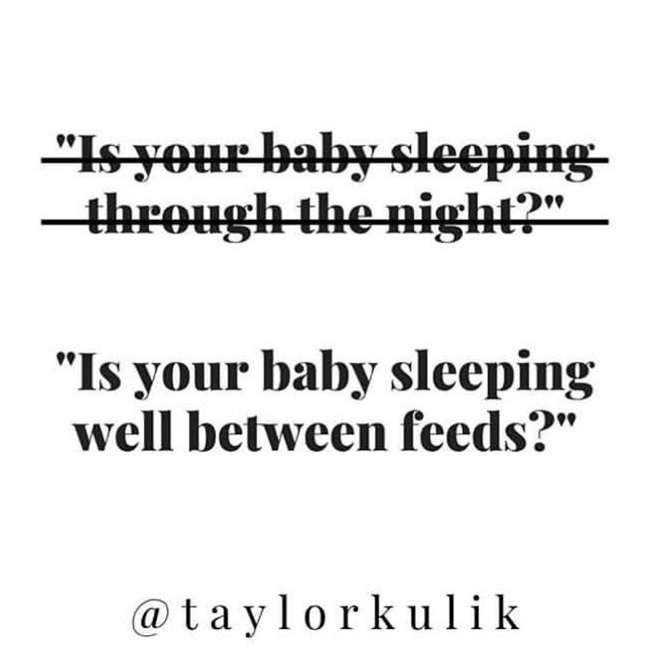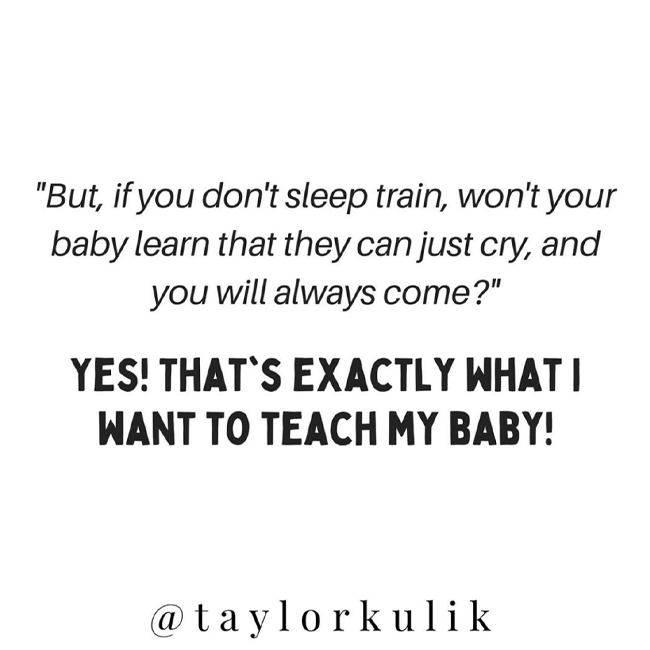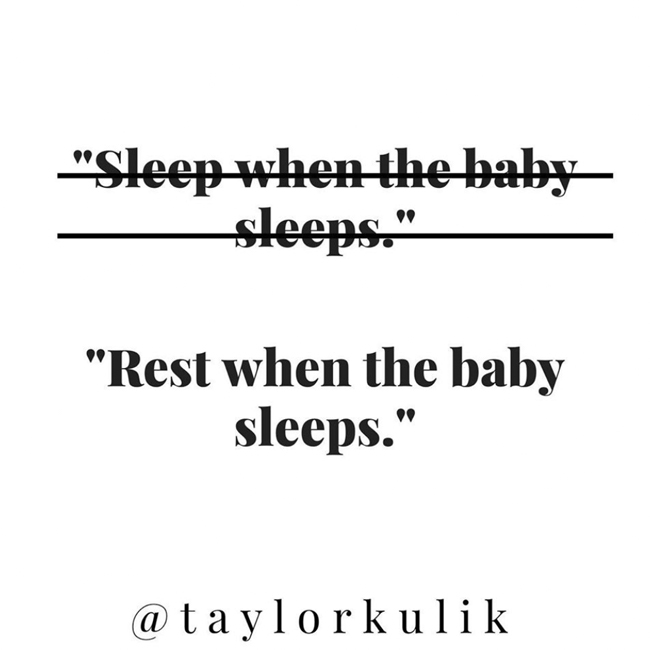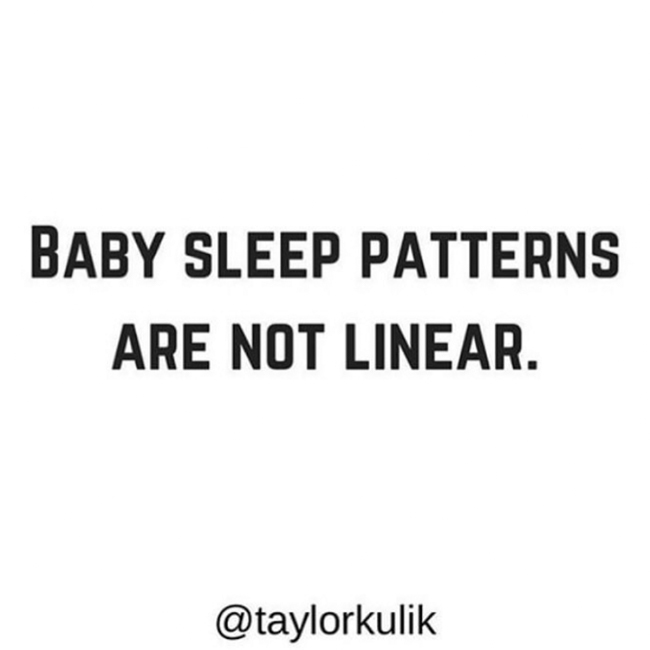It seems when you have a baby, the first thing everyone asks you is, “are they sleeping through the night?” Instantly that question sparked a mama bear fire within me, like I needed to defend my baby for her natural biological tendency to wake in order to eat, and have the comfort of mom (the only home she had ever known). For the first 3 months of my little one’s life, naps were in my husband’s arms, on me, in her carrier, in her stroller, or laid down somewhere near me, depending what I was doing. Then the questions came from many people (not meaning any harm), asking if she was putting herself to sleep, and if we were going to sleep train. At 3 months, it got to me, and I started to think that I should begin to teach her to “gently” fall asleep on her own. For her first nap of the day, I’d try my own little method of putting her down in her crib awake, but I’d still stay by her side, or hold her hand as she drifted off. Truth be told, I’ve tried my best to keep her first nap in the crib (or at least half of it), because as I’ve been solo parenting for the past almost 3 months now, that’s been the time when I can shower, get ready, and prep some food!
But, what continued to bother me was the feeling that nagged at me…I wanted to rock her, or nurse her, or cuddle her to sleep. Then for her other naps of the day (that are always on me, in her carrier, or in her stroller), guilt crept in every time someone said to me…(you know that “should” guilt?!)… “you should put her down to sleep”, “she should fall asleep on her own”, “you should wait before rushing in to help her”, “she should sooth herself”. Luckily, I never deviated too much from what I felt was right for me and my baby. I’ve always wanted her by me, and she’s always wanted to be by me as well. I’ve tried to listen to her cues and needs as she grows and changes. Luckily, I have many friends with babies that feel the same as me, and we would FaceTime and text and champion each other with our decisions to embrace this time with our babies and not rush them to be independent before they were ready. We told each other it was more than okay to cuddle, rock, hold, wear, and love up on our babies during all those naps. We told each other it was okay to nurse them again and again in the night, knowing that these things won’t last forever, and that they won’t be cuddling us and nursing to sleep when they are 16-years-old…even if we want them to.
Along the way, a friend introduced me to Taylor Kulik’s platform, and everything she said spoke to me so deeply. Since then, I’ve taken her infant sleep course, which completely resonated with everything I’ve felt and done as a parent so far, and I’ve joined in on some of her webinars. She talks about empowering parents, and she does exactly that. I am so honoured that Taylor has agreed to speak with me.
Taylor, thank you for taking the time to support so many parents and caregivers, and for sharing your knowledge with all of us! Can you start by telling everyone a little about you, your family, and your work?
Thanks so much for having me, Lauren! I’d love to share more about myself! I’m mama to two little ones – a 3-year-old and a 4-month-old, and I have an amazing, supportive husband, Andy. I’m an occupational therapist, and after the birth of my first child, I began to see this huge gap in information and support for families who choose not to sleep train. I became passionate about learning about biological infant sleep, safe bedsharing, and how to support our child’s sleep with emphasis on the relationship. I struggled so much with sleep the first 6 months of my daughter’s life. Most of my memories from this time period are of sitting in her dark nursery trying over and over to get her to “self-soothe” for her naps. I spent all day in that room! I had so much anxiety surrounding sleep based on what I thought I should be doing and what she should be doing, that I wasn’t even able to enjoy my time with my baby. Once I surrendered to her needs, I felt like I could breathe and just let us “be”. Now, I support families who choose not to sleep train to understand their child’s sleep needs, improve sleep, assess underlying factors that may be impacting sleep, and gently shift patterns as needed, all while focused on the attachment relationship.
Because I took your course, I know how you approach many of these areas of sleep. I highly recommend everyone checks out your course, as you also go over different scenarios depending on the age & temperament of the child, and how the parents want their family unit to run. But, I’m looking forward to you explaining what you can to others, in this short time! Can you explain what attachment-focused sleep is?
Attachment-focused sleep is responding to and supporting our children to sleep in a way that fosters a healthy attachment relationship. Many people misunderstand and think this means that your baby has to bedshare or you have to always nurse to sleep etc., but this isn’t the case. My first priority is always educating families on what is normal and what they might expect in terms of sleep. There are just some things we really don’t have much control of when it comes to our babies. For example, it is completely normal for our babies to want to be close to us and sleep better when they are right next to us. It gets easier as they get older and are able to be a bit more independent from us, but it’s so important to understand that our babies are meant to depend on us! Attachment-focused sleep helps parents improve sleep and shift sleep patterns that no longer work for them in a way that is always responsive and respectful of their child’s needs. Whereas most conventional sleep trainers and sleep training programs focus on increasing separation (regardless of the child’s temperament, age, feeding issues, health issues, etc.), attachment-focused sleep is holistic and views the child as a unique individual with unique needs. We explore the root cause of the sleep issue (if there is a sleep issue), and work with the child’s personality and temperament to slowly make respectful changes with an emphasis on connection.
Many people asked if you can spoil a baby by rocking them to sleep/nursing them to sleep/cuddling them to sleep, etc.?
Absolutely not, and it destroys me that we have come to a place where most parents think that connecting with their baby is a bad thing. This could not be farther from the truth. The truth is that most babies need support to get to sleep – this is totally normal. You can never spoil a child by offering them connection and support. We foster our child’s independence (in their own time – when developmentally appropriate, not at age 5 months, for example) through allowing them to fully depend on us. It is only then that they can feel safe and secure enough to branch out and be independent. Forcing independence usually backfires.
How do you avoid getting defensive from other people’s judgement, when it comes to choosing to parent with attachment-focused sleep (and not sleep training)?
I think that it’s human nature to get a bit defensive when people are judging our choices, right? But, when we can be confident and secure in our decisions, it is so helpful, and that’s why I think it’s so important to empower parents with accurate information about biological infant sleep. So many parents feel in their gut that some sleep training techniques just don’t feel right, yet we are being bombarded with information that goes directly against what our instincts are telling us. We are essentially being sold the lie that our instincts are wrong. When we understand that what we’re being sold about baby’s sleep is just that – a lie – we can become really confident in our choices and not let the judgement from others get to us as much. I also am a big advocate for setting healthy boundaries, and sometimes this needs to happen when people we are close with want to always make judgemental remarks about our parenting choices. It’s okay for us to tell them that these topics are off limits, if we need to.
Do you believe there is a certain age you should move away from letting your baby nap on you?
Whenever it no longer works for you! There is no age that it is a bad thing to let baby nap on you. I think it’s also really important for parents to understand that contact napping is absolutely the norm for young babies, and many babies won’t nap in a crib at all until closer to 6-8 months.
Do you have any advice for ways to be productive during nap time if your baby is napping on you, or if you are bed sharing (once you’ve put your baby down at night and need to stay near them)?
For daytime naps, I think baby-wearing is an amazing tool that can help you get things done around the house, if that works for you! At night, if you need to lay in bed with your baby, I always recommend that parents try to do something relaxing, like listening to an audiobook, podcast, meditation, or guided relaxation. Otherwise, it’s a good idea to rest when your baby sleeps, especially if you are up frequently at night.
Do you have any quick advice for how to help your baby feel comfortable in the crib without sleep training?
It’s important to first understand that our babies are meant to be near us, so it makes total sense (and is completely normal) that they sleep better next to us. Infants attach to us through the senses, so when trying to get baby comfortable with their crib, think of how you can nurture those sensory-based attachment instincts. For example, sleeping on the crib sheets can make them smell like you, and putting a heating pad or warm towel down in the crib (and removing it before laying baby down!), can mimic the warm sensation of being held by you. Otherwise, make sure that baby views the crib as a safe and positive place to be! Spending time in the crib playing and laughing during the day can help with this.
Is it common that the way baby goes to sleep is the same way they will need to get put back to sleep?
Babies do get used to certain patterns of being put to sleep, but that doesn’t necessarily mean that they always have to be put to sleep and fall back asleep in the same way. An example of this is a mother who loves to nurse her toddler to sleep initially, but does not want to nurse her child every time they wake. This mother can absolutely incorporate some other sleep associations and strategies to help support her child back to sleep in the middle of the night (like cuddling, patting, etc.). Similarly, when different caregivers are supporting sleep, they will often have different strategies that work best for them, and the strategies they use won’t always be identical.
What is your best advice for moms (or parents) to maximize sleep if they feel they need more?
Try to implement a relaxing bedtime routine, if possible. Turn off electronics an hour before bed, and instead take a relaxing bath to unwind, read, do some gentle stretching, or if you have to be in bed with your baby, listen to a mindfulness exercise or progressive relaxation exercise. When your baby wakes, try not to look at the clock every time, as this can just lead to increased stress surrounding sleep. If possible, stay off your phone during the night and keep the room peaceful and calm.
What do you tell parents whose toddlers/older children are coming into the parents’ bed in the middle of the night, and the parents don’t want to share their bed?
I think it’s helpful to understand that this is often caused by a toddler feeling disconnected and searching for more proximity and connection with the parent. Oftentimes, just offering our child even more connection that they want during the day and evening hours can be really helpful! I would also encourage parents to really think about what they are okay with. Could they set up a little mattress for their child on the floor and welcome them? If they absolutely do not want the child to come in the room at night, then they need to set that boundary. Tell the child that if they need the parent, they will always come to their room and respond to them, and that if the child comes to the parent’s room, they will be walked back to their own room and supported to sleep.
There has been lots of misleading information given to parents about “safe sleep”; how do you explain safely sleeping while bedsharing, or wearing/cuddling?
Since most breastfeeding mothers bedshare at some point, even when they don’t plan to, it’s so important to educate parents how to bedshare safely! There is risk to any sleeping arrangement, including a baby sleeping in a crib, according to the gold standard “safe sleep” guidelines. Dr. James McKenna is a great resource for safe bedsharing guidelines which include (but are not limited to): baby on the back, with a breastfeeding mother, on a firm mattress with no pillows/blankets near the baby. I have an entire highlight devoted to these guidelines on my Instagram account for anyone looking to explore more. One really important point that I want to emphasize here is that a baby is meant to be close to their parent, and this has signficant benefits to baby. Specifically, mother and baby interact dynamically when they are sleeping near each other, in a way that is physiologically beneficial to baby.
Do you have any suggestions for making bedsharing more comfortable if your child moves around a lot during the night?
Get a king sized bed (kind of kidding, but really, it’s amazing!). The gold standard safe way to bedshare with an infant is to sleep around them in a protective “c” shape, so sometimes this can help to keep them from moving too much, especially if they are moving towards you to get closer to you. I would also just focus on maximizing your own comfort as the parent, knowing that it may be inevitable that your active baby wakes you sometimes (try sleeping with a pillow between your legs). You could also try a sidecar set-up which gives your baby their own space while still effectively bedsharing with them.
Is there anything else you want to share?
Thanks for having me, Lauren! I just want to encourage parents to trust their intuition. If someone is giving you a piece of advice that just doesn’t sit well with you (even your doctor), you should listen to that and honor it. It’s okay (and good) for us to question the parenting norms!
Where can people find you?
You can find more about the services and eCourses I offer at my website. I am also on Instagram and Facebook, where I share more information and answer questions in my stories, so please follow along!
Taylor, thank you so much again for sharing your wisdom, and being a safe space for parents to feel both comfortable and recognized in their attachment choices!!





